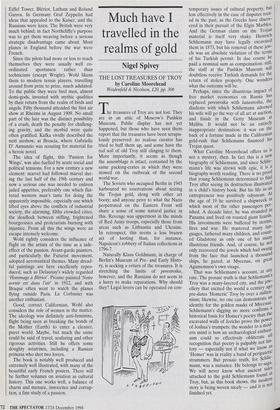Much have I travelled in the realms of gold
Nigel Spivey
THE LOST TREASURES OF TROY by Caroline Moorehead Weidenfeld & Nicolson, £20, pp. 306
he treasures of Troy are not lost. They are in an attic of Moscow's Pushkin Museum. Public display has not yet happened, but those who have seen them report that the treasures have been scrupu- lously preserved: no zealous curator has tried to buff them up, and some have the red soil of old Troy still clinging to them. More importantly, it seems as though the assemblage is intact, contained by the same packing-crates in which they were stowed on the outbreak of the second world war.
The Soviets who occupied Berlin in 1945 harboured no reservations about seizing the Trojan gold, along with other art booty; and anyone privy to what the Nazis perpetrated on the Eastern Front will share a sense of some natural justice in this. Revenge was uppermost in the minds of Red Army troops, especially those from areas such as Lithuania and Ukraine. In retrospect, this seems a less brazen act of looting than, for instance, Napoleon's robbery of Italian collections in 1796-7.
Naturally Klaus Goldmann, in charge of Berlin's Museum of Pre- and Early Histo- ry, is seeking a return of the treasures. It is stretching the limits of perestroika, however, and the Russians do not seem in a hurry to make reparations. Why should they? Legal levers can be operated on con- temporary issues of cultural property, but less effectively in the case of disputes root- ed in the past, as the Greeks have discov- ered in their pursuit of the Elgin Marbles. And the German claim on the Trojan material is itself very shaky. Heinrich Schliemann may have legally excavated them in 1873, but his removal of these jew- els was an absolute violation of the terms of his Turkish permit. In due course he paid a nominal sum as compensation: still, the staff at the Pushkin Museum will doubtless receive Turkish demands for the return of stolen property. One wonders what the outcome will be.
Perhaps, since the disastrous impact of free market economics on Russia has replaced perestroika with katastroika, the diadems with which Schliemann adorned his wife will go the way of all art at auction, and finish in the Getty Museum at Malibu. It would not be an entirely inappropriate destination: it was on the back of a fortune made in the Californian gold-rush that Schliemann financed his Trojan quest. What Caroline Moorehead offers us is not a mystery, then. In fact this is a new biography of Schliemann, and since Schlie- mann's life was strewn with epic, it is a biography worth reading. There is no proof that young Schliemann determined to find Troy after seeing its destruction illustrated in a child's history book. But his life as an entrepreneur was positively odyssean. At the age of 19 he survived a shipwreck in which most of the other passengers per- ished. A decade later, he was stranded 10 Panama and lived on roasted giant lizards. His investments were buffeted by storms, fires and war. He mastered many lan- guages, fathered many children, and count- ed Gladstone as only one of his many illustrious friends. And, of course, he not only recovered the jewels which had swung from the face that launched a thousand ships, he gazed, at Mycenae, on great Agamemnon's own visage. That was Schliemann's account, at any rate. The prosaic truth is that Schliemann s Troy was a many-layered city, and the Jew- ellery that excited the world a century ago pre-dates 'Homeric' Troy by over a millen- nium; likewise, no one can demonstrate all identity for the golden masks of Mycenae' Schliemann's digging no more confirms a historical basis for Homer's poetry than the excavated walls of Jericho prove the power of Joshua's trumpets: the wonder to a mod- em mind is how an archaeological enthusi- asm could so effectively obliterate 11 recognition that poetry is palpably not his- tory — especially not if what we law* as `Homer' was in reality a band of peripatetic strummers. But prosaic truth, for Schlie- mann, was a nuisance. He belongs to saga. We will never know what ancient tales attached to the gold Schliemann found at Troy, but, as this book shows, the modern story is being woven nicely — and it is 1101 finished yet. atetic










































































































 Previous page
Previous page